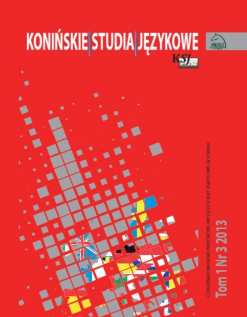Teachers’ positive and negative oral feedback patterns and their discoursal realization: The case of four communicative EFL classes
Teachers’ positive and negative oral feedback patterns and their discoursal realization: The case of four communicative EFL classes
Author(s): Marzieh BagherkazemiSubject(s): Foreign languages learning, Language acquisition, Higher Education
Published by: Akademia Nauk Stosowanych w Koninie
Keywords: discoursal realization; interaction; oral feedback; positive feedback; negative feedback;
Summary/Abstract: Language teaching research has substantiated the significance of feedback provision for the process of second language acquisition (SLA). This case study was an attempt to sketch four Iranian university English language instructors’ most frequently applied patterns of positive and negative oral feedback and their discoursal realizations in four BA-level communicative classes (two “Reading comprehension” and two “Speaking and Listening”). Transcripts totaling 10.16 hours of classroom interaction were analyzed using a corpus analysis approach. Coding was conducted manually from initial coding involving feedback moves’ detection, through axial coding involving second-order categorization, to selective coding involving positive and negative feedback moves’ designation. Codes were assigned with reference to the existing literature on teacher feedback types as well as the data’s idiosyncratic features, yielding a categorization exclusive to the present study. The results present the model as well as the frequency, distribution, and discoursal realization features of the 13 detected positive and negative feedback strategies. The findings indicated an overwhelming tendency for teachers to apply recast in the corrective feedback category, and acceptance in the positive feedback category; however, the teacher participants used a limited discursive repertoire to realize the various positive and negative feedback categories. The study has important implications regarding the necessity to distinguish between teacher oral feedback functions and their realization patterns in discourse.
Journal: Konińskie Studia Językowe
- Issue Year: 8/2020
- Issue No: 1
- Page Range: 65-84
- Page Count: 20
- Language: English

